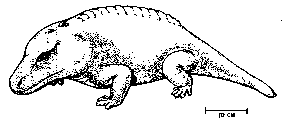 Dissorophoidea: Amphibamus, Cacops, Doleserpeton, Platyhystrix.
Dissorophoidea: Amphibamus, Cacops, Doleserpeton, Platyhystrix.| Temnospondyli | ||
| The Vertebrates | Dissorophoidea |
| Vertebrates Home | Vertebrate | Vertebrate |
|
Abbreviated Dendrogram
Tetrapoda
├─┬─Lepospondyli
│ └─Reptiliomorpha
│
└─Temnospondyli
└─┬─Edopoidea
└─┬─Dendrerpeton
├─Dvinosauria
└─┬─Euskelia
│ ╞═Dissorophoidea
│ │ └─Lissamphibia
│ └─Eryopoidea
└─Stereospondyli
├─Rhinesuchidae
└─┬─Lydekkerinidae
├─┬─Plagiosauroidea
│ └─┬─Rhytidosteidae
│ └─Brachyopoidea
└─┬─Capitosauria
└─Trematosauria
├─Trematosauroidea
└─Metoposauroidea
|
Contents
Index |
This is an important and ecologically diverse group of Carboniferous and early Permian amphibians. They represent one of the major radiations of early temnosopondyl evolution, including everything from small aquatic and neotenous branchiosaurs and micromelopertontids to sturdy terrestrial Cacops to Eryops-like Trematops to ancestral lissamphibians like Doleserpeton and Gerobatrachus. They really deserve a page or even several pages dedicated to them and their evolutionary history, and hopefully these will be added soon. Until then (and even afterwards) we couldn't do better than recommend Darren Naish 's Tetrapod Zoology blog post on the subject. Apart from that, all we can offer at the moment on this fascinating group is a short technical description and an under construction sign. MAK111122
 Dissorophoidea: Amphibamus, Cacops, Doleserpeton, Platyhystrix.
Dissorophoidea: Amphibamus, Cacops, Doleserpeton, Platyhystrix.
Range: from the Carboniferous.
Euskelia: Eryopoidea + *: Lissamphibia.
Characters: prefrontal not contacting postfrontal; otic notch extremely large & semi-circular; otic notch occupies entire back of squamosal; $ palatine dorsolateral margin exposed in orbital margin; $ narial, prefrontal and supratympanic flanges (?); $ orbits and pineal foramen large; interclavicle short & square; clavicles with narrow blades; long, slender limb elements; humerus slightly elongate & lacks supinator process.
Links: Dissorophoidea; Phylogeny and Apomorphies of Temnospondyls; Dissorophoidea an older phylogeny); Zajic Milner Klembara 1990.pdf; Herpetology: Phylogeny and Tetrapods; Biology 356; ANFÍBIOS.
Notes: Those who favor a temnospondyl origin for extant amphibians generally identify the dissorophids as the ancestral stock. ATW021002.
checked ATW060327